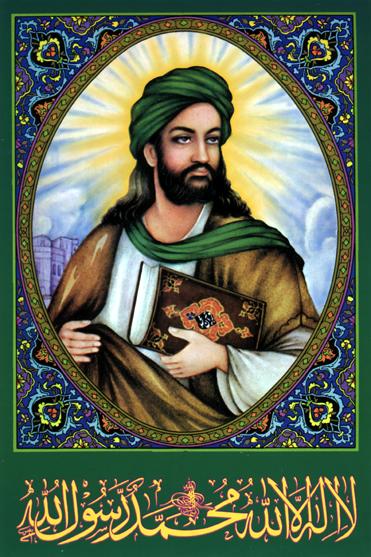Shri Prophet Muhammad & his teachings
Shri Prophet Muhammad
Muhammad was born in 570 in the Arabian city of Mecca. His birth was marked by exceptional events such as an immense bright light shining from East to West. He belonged to the Banu Hashim, one of the prominent families of Mecca, although they were not prosperous during Muhammad’s early life. In Arabic Muhammad means ‘he who is greatly praised’.
Muhammad had the chance to get in touch with the Harif, a monotheist people, who do not subscribe to any revealed religion. During business trips to Syria and Yemen with his uncle, Muhammad met several Jewish and Christian tribes.
These journeys gave Muhammad the opportunity to widen his knowledge of religious and social fields. Khadìja, fascinated by the high spiritual value of Muhammad, married him when Muhammad was 25. They were happily married for 25 years and had 6 children, one of them, Fatima, was an incarnation of Gruha Laxmi.
When her husband received his first revelation from the Archangel Gabriel, Khadija was the first person (besides Muhammad) to convert to Islam, which she did not hesitate to embrace, trusting to her husband's teachings. She remained at his side and supported him throughout his mission to spread Islam until her death in 619.
In 610 Muhammad started to give lectures based on the Revelation received from the archangel Gabriel, which consisted of a set of rules of a monotheist religion, dedicated to the exclusive cult of God, which were unique and indivisible.
But his preaching caused an immediate reaction from the other idolatry religions in Mecca. These conflicts lasted for 13 years and in the end Muhammad was forced to move and settle in Medina. This flight, the famous Egira, sanctioned the final break with the faithless and also marked the start of a period of war. In January 630, Muhammad conquered Mecca with an army of ten thousand followers and without opposition from its inhabitants.
Prophet Muhammad died 2 years later in Medina.
His teachings are collected in the Qu'ran, which was edited 40 years after the his death by the man who killed Hazrat Ali (Muhammad's son-in- law) and his two sons, so it is not clear how much of the Quran come from the Master himself. But it is nice to notice that Muhammad never made Islam an exclusive religion in the Quran and very respectfully talked about Moses, Abraham, Christ and his mother Mary.

The
teachings of Muhammad have touched on many subjects. The right behaviour was at
the centre of deep and repeated reflections.
About moderation: “Don’t kill your hearts with excess of drinking and eating.”
“Closest to
me are the sober men, whoever they are and wherever they are.”
About sense of guilt: “Do not torment yourself with the fear that Allah will punish you.” “God saith, ‘Verily my
compassion overcometh my wrath’.”
About rest and balance of energetic centres: “Do not work too much, because by not wearing out
yourself you do not fall ill.”
About compassion: “God is merciful towards those who are mercy to others.”
“Once Muhammad was asked, ‘O Apostle of God! How many times are we to forgive
our servant's faults?’ He was silent. Again the questioner asked, and Muhammad
gave no answer. But when the man asked a third time, he said, ‘Forgive your
servants seventy times day’.”
About the true Jihad: “The most excellent Jihad (striving in the way of Allah) is that of
conquering ourselves.”
“‘Give me
advice’ someone asked to Muhammad who replied: ‘do not get angry’”
“He is not
so strong and powerful who flings himself against people, but he is strong who
removes rage from himself.”
About education: “Humility and good manners are the qualities of mercy.” "Certainly
for a man it is better teaching good manners to his son than giving a big sack
of grain in charity.”
About the middle way and the good character: “A good character, who reflects on matters and a
middle way in everything, are a part of the 24 parts of the qualities of
prophets.”
“Surely the
dearest amongst you are those with the best character.”
About maryadas: “The borders have been set, so do not go beyond.” “Go straight along
the way without turning, don’t go past the doors otherwise you will get lost;
the open doors are the thing that Allah has forbidden, the curtains in front of
the openings are the limits established by Allah.“
About devotion and love: “Not even a minimum of the devotion of a man is
acceptable by Allah, if it is not expressed with intelligence and the true
participation of the heart.”
“You will
not enter paradise until you believe, and you will not believe until you love
one another.”



Comments
Post a Comment